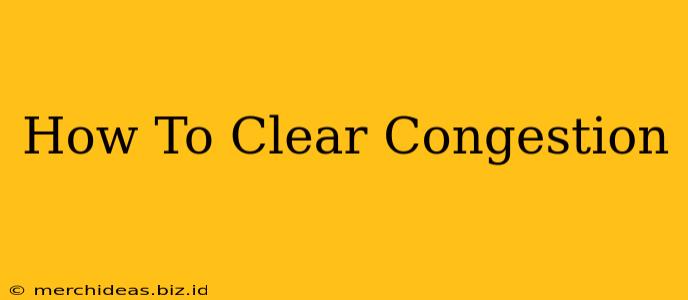Feeling stuffy and congested? It's incredibly uncomfortable, impacting everything from sleep to your mood. But don't worry, there are several ways to effectively clear congestion and breathe easier. This guide will explore various methods, from simple home remedies to when you should see a doctor.
Understanding Congestion
Before diving into solutions, it's important to understand what causes congestion. Congestion occurs when the nasal passages and sinuses become inflamed and swollen, often due to:
- The common cold: Viral infections are a primary culprit, leading to mucus buildup.
- Allergies: Pollen, dust mites, pet dander, and other allergens trigger inflammation.
- Sinusitis: Inflammation of the sinuses can cause severe congestion.
- The flu: Influenza can also cause significant congestion and other symptoms.
- Environmental irritants: Smoke, pollution, and dry air can irritate the nasal passages.
Knowing the underlying cause can help determine the most effective treatment.
Home Remedies for Congestion Relief
Many effective remedies can be used at home to alleviate congestion:
1. Saline Nasal Spray or Rinse:
A saline nasal rinse or spray helps to flush out irritants and mucus from your nasal passages. You can purchase pre-made saline sprays at most pharmacies or make your own using distilled water and salt. This is a gentle and effective method for many people.
2. Stay Hydrated:
Drinking plenty of fluids, especially water, helps thin the mucus, making it easier to drain. Warm liquids like broth or herbal tea can be particularly soothing.
3. Use a Humidifier:
Dry air can worsen congestion. A humidifier adds moisture to the air, helping to loosen mucus and ease breathing. You can also try placing a bowl of hot water near your bed to add moisture to the air.
4. Elevate Your Head:
Sleeping with your head elevated on an extra pillow can help drain mucus and reduce nighttime congestion.
5. Warm Compress:
Applying a warm, damp compress to your forehead or sinuses can help soothe inflammation and relieve pain.
6. Over-the-Counter Medications:
Several over-the-counter medications can help relieve congestion, including:
- Decongestants: These medications temporarily shrink swollen blood vessels in the nasal passages. However, overuse can lead to rebound congestion, so follow the recommended dosage carefully.
- Expectorants: These help thin mucus and make it easier to cough up.
- Pain relievers: Over-the-counter pain relievers like acetaminophen or ibuprofen can help relieve headache and body aches associated with congestion.
When to See a Doctor
While home remedies can often effectively relieve congestion, it's important to seek medical attention if:
- Your congestion lasts for more than 10 days.
- You have a high fever (over 101°F or 38.3°C).
- You experience severe pain or pressure in your sinuses.
- You have difficulty breathing.
- You have green or yellow mucus (this can indicate a bacterial infection).
- You have other concerning symptoms such as a severe cough or chest pain.
Preventing Congestion
Prevention is key! Here are some tips to help prevent congestion:
- Wash your hands frequently: This helps prevent the spread of viruses.
- Avoid allergens: If you have allergies, identify and avoid your triggers.
- Get enough sleep: A well-rested immune system is better equipped to fight off infections.
- Eat a healthy diet: A nutritious diet supports a strong immune system.
By following these tips and seeking medical attention when necessary, you can effectively manage congestion and breathe easier. Remember to always consult with your doctor or other healthcare professional for personalized advice.
